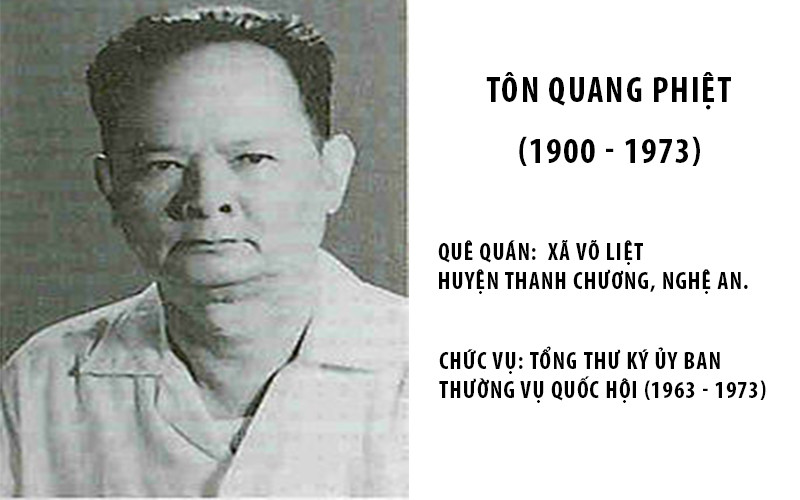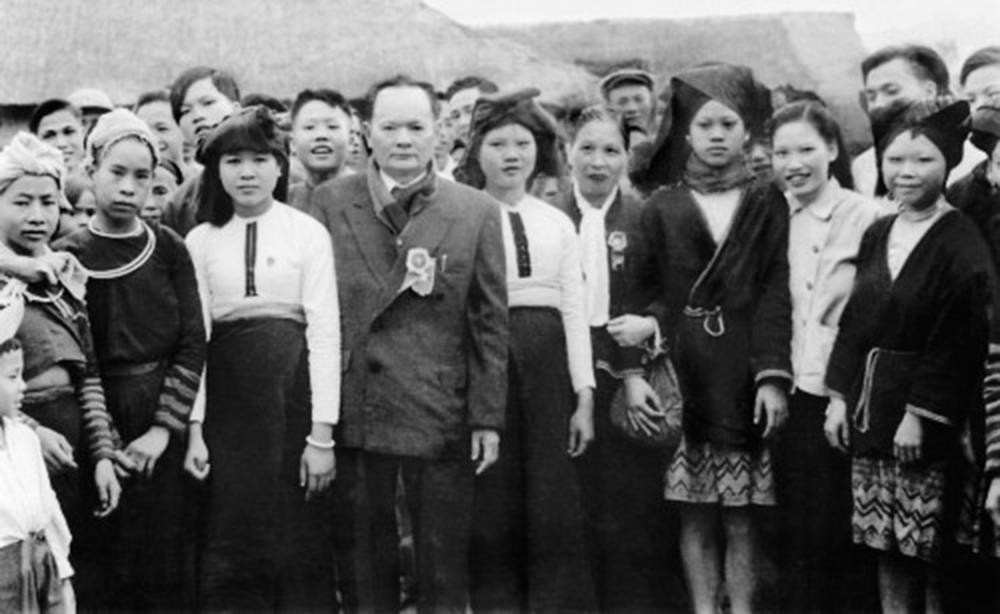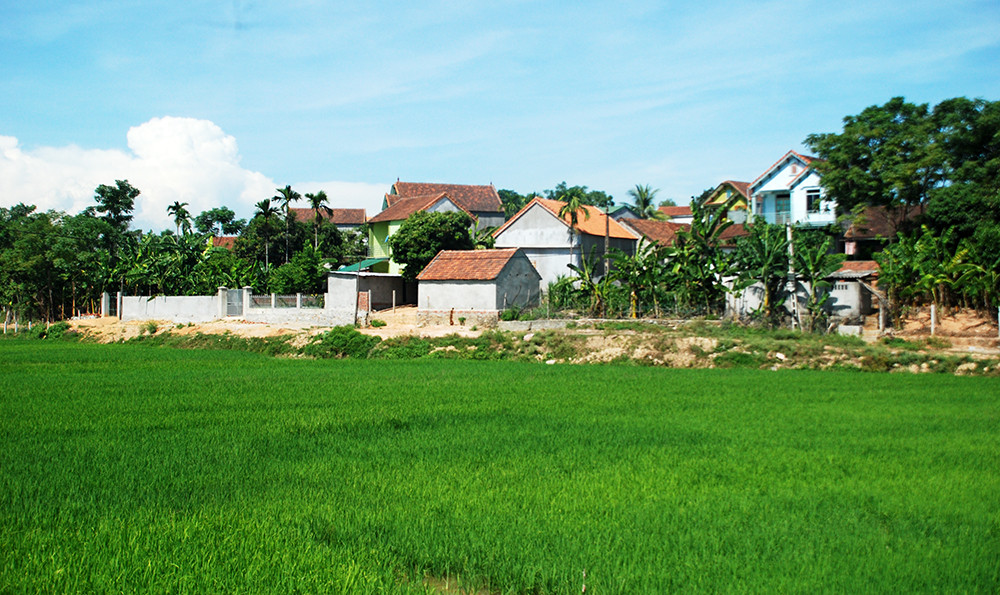Revolutionary Ton Quang Phiet and valuable literary and historical research works
(Baonghean) - Ton Quang Phiet (1900 - 1973), hometown in Vo Liet commune, Thanh Chuong district, where the Ro river flows into Lam Giang.
From Vo Liet looking to the North bank is the Ngoc mountain range (locally called Ru Nguoc), creating a secretive and dangerous North-South water and land traffic hub, connecting the great forest with the ocean.
This is a land of generations of scholars and fighting spirit. In the Ton family alone, during the period 1925-1945, two famous intellectual revolutionaries appeared, also two siblings: Ton Quang Phiet and Ton Thi Que. They were both party members who had participated in the struggle led by the Indochinese Communist Party and were many times arrested and imprisoned by the French colonialists.
After the success of the August Revolution, both were elected to the National Assembly. Ton Quang Phiet, who led the August Revolution in Thua Thien - Hue, then became Chairman of the provisional People's Committee of Thua Thien - Hue province. After the General Election on January 6, 1946, he went to Hanoi, continuously held the position of General Secretary and then Deputy Head of the National Assembly Standing Committee until 1973.

Born into a Confucian family, his father was a Bachelor who worked as a teacher, Phiet was good at reading from a young age, was good at parallel sentences, poetry and was fond of research. When he was old enough to take the provincial exam, the Chinese examination system was abolished, he transferred to study at the Franco-Vietnamese school and passed the first high school course at College Vinh (1920-1924).
After that, Ton Quang Phiet went to Hanoi to study at the Indochina Pedagogical College. During his first year there, Ton Quang Phiet joined a student revolutionary organization. In July 1925, an important political event occurred in the country when revolutionary Phan Boi Chau was arrested by French secret police in Shanghai (China), then brought back to Vietnam, detained at Hoa Lo Prison (Hanoi), awaiting sentencing.
That summer, Ton Quang Phiet returned to his hometown to rest. On July 14, 1925, he participated in the establishment of the Hung Nam Association in Vinh (Nghe An), whose first organizers were: Tran Phu, Tran Dinh Thanh, Ngo Duc Dien... They invited the First Prize winner Le Van Huan (a former political prisoner who returned from Con Dao prison) to be the leader. The association aimed to lead the people to expel the French colonialists and restore national independence. Later, the association transformed into the Indochina Communist Federation, one of the three predecessor organizations of the Communist Party of Vietnam...
In the new school year (1925-1926), when Ton Quang Phiet went to Hanoi to continue his studies, the French colonialists opened the trial of the Phan Boi Chau case. He and a number of students skipped school to watch, in order to contribute to the fight to protect the patriot Phan.
 |
| Deputy Head of the Standing Committee of the 1st National Assembly Ton Quang Phiet (4th from left). Photo: File |
Regarding the relationship between these two, we know that when Ton Quang Phiet was 10 years old, Phan Boi Chau was already a famous name in Hong Lam land in terms of literature, affirmed by his academic degree of "First place, first name" at Nghe School and his ambition to be a man.
Such realities in his homeland contributed to enriching Ton Quang Phiet's knowledge and his appreciation of his manly spirit as well as his later research work, including the historical topic "Phan Boi Chau".
Going back in time, Phan Boi Chau and before that, his father, Mr. Do Pho, also taught at Vo Liet. In 1925, Mr. Phan was imprisoned for life by the French colonialists in Hue. At first, they let him stay at Nguyen Ba Trac's house (who had previously followed the Dong Du movement and then surrendered to the enemy, and was given a position as an official in the court). Ton Quang Phiet was studying at Hanoi Pedagogical College. He, on behalf of the students there, wrote a letter to Mr. Phan with infinite sympathy and the hope that he would always be clear-headed so that his patriotic example would be brighter for his descendants to follow. The letter contributed to the decision of Mr. Phan, with the help of his compatriots near and far, to build his own house to live in for the rest of his life at Ben Ngu slope, Hue. From then on, he was respectfully called "Old Man Ben Ngu" by the people.
 |
| Some typical books of Ton Quang Phiet. |
As mentioned, Ton Quang Phiet, after the August Revolution (1945), although always busy with responsibilities to the nation, his main position was Chairman of the Provisional Revolutionary People's Committee of Thua Thien - Hue province and then continuously served as Deputy Head of the National Assembly Standing Committee from January 1946 until his death. But in the Viet Bac resistance base as well as when he returned to the capital Hanoi, he still spent a certain amount of time allowed to do research on literature and history.
Regarding the topic of "Phan Boi Chau", he devoted his efforts to collecting, translating and compiling the following essays and works: "Phan Boi Chau and Phan Chu Trinh"; "Phan Boi Chau Chronology" (translated with Pham Trong Diem), published by the Literature, History and Geography Publishing House in 1957; "Phan Boi Chau and a historical period of the Vietnamese people's resistance against the French"...
Regarding Phan's ideology, Ton Quang Phiet assessed: His ideology on Philosophy is basically the idealism of Confucian ethics mixed with the wild style of the traveling knights of the Spring and Autumn - Warring States period, with the tendency of the leisurely life of Lao-Trang. Such a respectful assessment of the historical figure Phan is also reasonable, because coming from the Confucian gate and Trinh yard, Phan trained himself to become a pre-Marxist revolutionary of Vietnam, who did not get along with the invaders of his country and ruled his people. Thus, he underwent a great "transformation".
Since his school days, Ton Quang Phiet had recognized that the place where he was born and grew up was related to Sa Nam village (his maternal hometown), down to Dan Nhiem (his paternal hometown) of Phan Boi Chau. It can be said that Ton Quang Phiet was a student of the Phan scholars in that regard, at least in terms of loyalty and humor. The folk literature of Nghe An has led them to successively blend the rusticity of the rivers and fields with the classic quality of Confucian poetry and literature. It helps us easily recognize the passion and enthusiasm of Ton in the pages written about the "Angel" of Vietnam in the last century.
At the end of the book “Phan Boi Chau and a historical period of the Vietnamese people's resistance against the French”, Ton Quang Phiet commented: “We can say that, in the history of national liberation of the Vietnamese people, before President Ho Chi Minh, Phan Boi Chau was a great figure”.
 |
| A peaceful corner of the countryside in Vo Liet commune (Thanh Chuong). Photo: Dinh Ha |
During his lifetime, our Party and State leaders also had very satisfactory assessments of author Ton.
“Anh Phiet was a revolutionary who not only worked domestically but also for friendship between socialist countries, peoples and for the struggle against colonialism. We must remember him and strive to follow his example.”
"Anh Phiet is a true revolutionary, steadfast, with loyal and pure friendship."
The virtue of "loyalty and purity" of Ton Quang Phiet is fully demonstrated in his public service as well as in his daily life and in his comments and praise of talented predecessors. With such an erudite and meticulous working style, Ton Quang Phiet's research on literature and history, especially the topic of Phan Boi Chau, has shown thoughtfulness and evaluation that is reasonable and worthy for us to learn.
